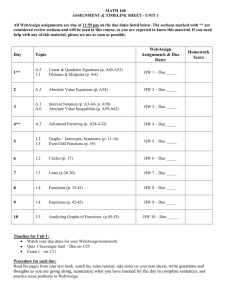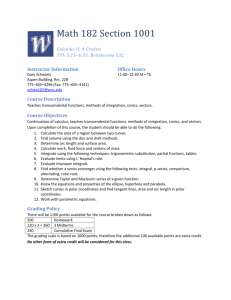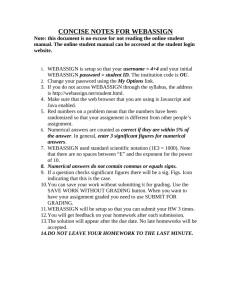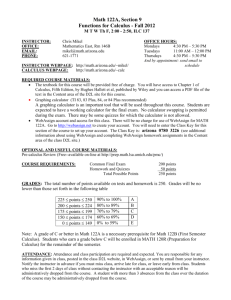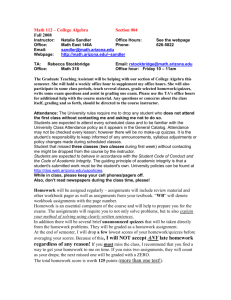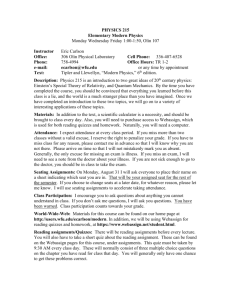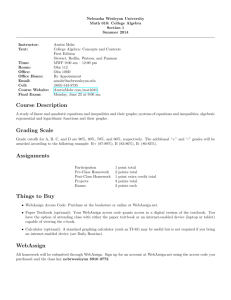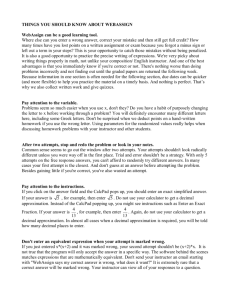Math 171 Statistics Fall 2014 Instructor: William Abrams (abramswp
advertisement
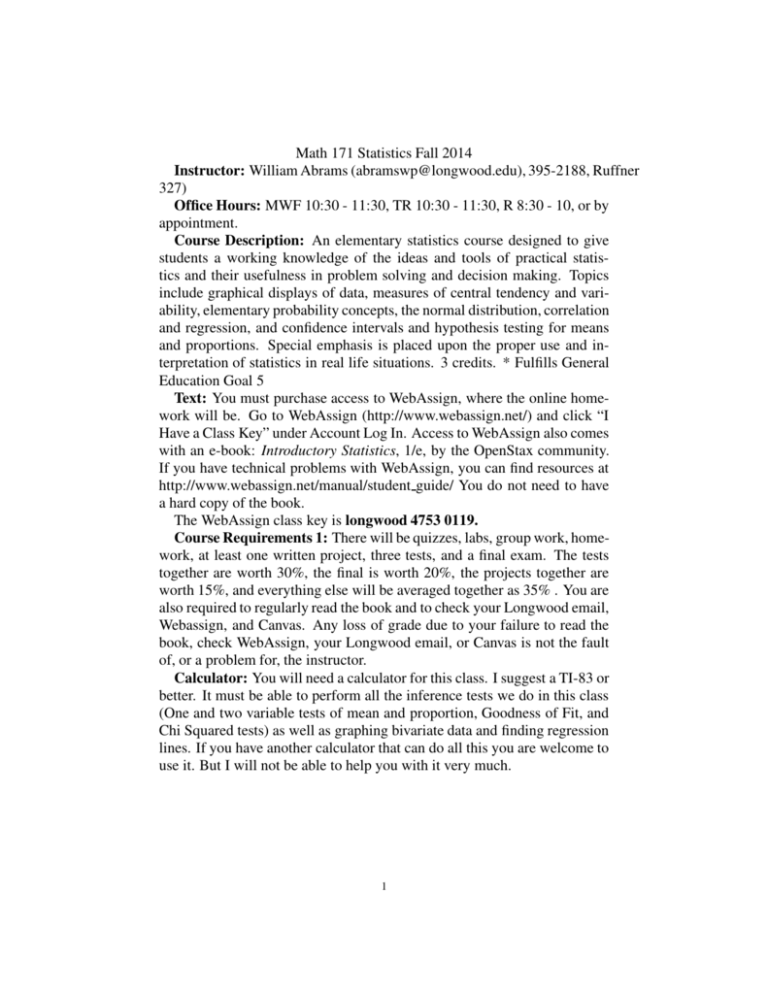
Math 171 Statistics Fall 2014 Instructor: William Abrams (abramswp@longwood.edu), 395-2188, Ruffner 327) Office Hours: MWF 10:30 - 11:30, TR 10:30 - 11:30, R 8:30 - 10, or by appointment. Course Description: An elementary statistics course designed to give students a working knowledge of the ideas and tools of practical statistics and their usefulness in problem solving and decision making. Topics include graphical displays of data, measures of central tendency and variability, elementary probability concepts, the normal distribution, correlation and regression, and confidence intervals and hypothesis testing for means and proportions. Special emphasis is placed upon the proper use and interpretation of statistics in real life situations. 3 credits. * Fulfills General Education Goal 5 Text: You must purchase access to WebAssign, where the online homework will be. Go to WebAssign (http://www.webassign.net/) and click “I Have a Class Key” under Account Log In. Access to WebAssign also comes with an e-book: Introductory Statistics, 1/e, by the OpenStax community. If you have technical problems with WebAssign, you can find resources at http://www.webassign.net/manual/student guide/ You do not need to have a hard copy of the book. The WebAssign class key is longwood 4753 0119. Course Requirements 1: There will be quizzes, labs, group work, homework, at least one written project, three tests, and a final exam. The tests together are worth 30%, the final is worth 20%, the projects together are worth 15%, and everything else will be averaged together as 35% . You are also required to regularly read the book and to check your Longwood email, Webassign, and Canvas. Any loss of grade due to your failure to read the book, check WebAssign, your Longwood email, or Canvas is not the fault of, or a problem for, the instructor. Calculator: You will need a calculator for this class. I suggest a TI-83 or better. It must be able to perform all the inference tests we do in this class (One and two variable tests of mean and proportion, Goodness of Fit, and Chi Squared tests) as well as graphing bivariate data and finding regression lines. If you have another calculator that can do all this you are welcome to use it. But I will not be able to help you with it very much. 1 2 Tentative Schedule: Week Dates Week 1 Aug. 25 - 29 Tentative Topics Numbers & Page Experimental Design and Sampling, 9 - 40 Sept. 1 Labor Day Week 2 Sept. 2 - 5 Descriptive Statistics, 16 - 112 Sept 2 Last Day to Drop Classes Week 3 Sept. 8 - 12 Two Way Tables, 164 - 184 Week 4 Sept. 15 - 19 Discrete Probability, 225 227 Week 5 Sept. 22 - 26 Normal Distribution & Continuous Probability 337 - 350, TEST I Week 6 Sept. 29 - Oct. 3 Normal Distribution & Continuous Probability Week 7 Oct. 6 - 10 Sampling Distribution & CLT, 369 - 375, 427 - 428 Oct 13 - 14 Fall Break Week 8 Oct. 13 - 17 Sampling Distribution& CLT Oct. 15 Last Day to Withdraw with aW Week 9 Oct. 20 - 24 Z-Test for One Mean, 413 426, 469 - 485, Test II Week 10 Oct. 27 - 31 Z-Test for One Mean Week 11 Nov. 3 - 7 T -test for One Mean, 422426,490-492,541-547 Week 12 Nov. 10 - 14 Two Sample T -Test, 526 - 533 Week 13 Nov. 17 - 21 Chi-Square Tests, 577 - 592 Week 14 Nov. 24 - 25 Chi-Square Tests, Test III Nov. 26 - 28 Thanksgiving Week 15 Dec. 1 - 5 Bivariate Data and Regression Grading: Suppose your numerical grade is x. If 92 x < 100 then you get an A. If 90 x < 92 then you get an A-. If 88 x < 90 then you get a B+. If 82 x < 88 then you get a B. If 80 x < 82 then you get a B-. If 78 x < 80 then you get a C+. If 72 x < 78 then you get a C. If 70 x < 72 then you get a C-. If 68 x < 70 then you get a D+. If 62 x < 68, then you get a D. If 60 x < 62 then you get a D-. If x < 60 then you get an F. 3 Labs: Labs must be worked in groups of three or four students. The answers that you all turn in should be the consensus of the group . ) In a lab you may collaborate with the members of your group and the instructor. You may use your calculator, text, and notes unless you are told otherwise. You are also allowed to use anything that we say in class discussion. Tests: The tests will assume that you have come to class, done everything asked of you in class, taken all the quizzes, and done all the homework. They will also assume that you understand all that stuff. If you do not understand all that stuff, I strongly suggest you do something about it. Assuming that everything will get better its own never works. The tests are individual work involving only your brain and the calculator. You may not get help from anyone or anything else on the test. Except that you may ask questions of the instructor. Quizzes: These will be brief and will be given irregularly at the beginning of class or online. These quizzes are open book, notes, and calculator, but you cannot confer with anyone else. I do not have to have taught the material in order to give you a quiz, if I ask you to read the material before class then the quiz can be based on the reading. Note that online quizzes might be timed and have suggestions as to what you should read before you take them. While I will try to email you if there is an online quiz, please get in the habit of checking Canvas and StatsPortal regularly the day before class just in case. Homework: The homework will be assigned through Webassign. The homework is to be your own work, although you can use your text, notes, and calculator. Also remember you can always ask questions of the instructor. Projects: Projects will be done individually. They will involve mathematics, but you will also be graded on how you present the mathematics, in particular these projects will require a substantial amount of writing. Grammar and syntax will be part of the grade. I will give you more details when I assign the projects. Required Tutoring: Our goal is to increase student success in this course. If you haven’t done so already, you must take the QLRA test. One purpose of this quiz is to identify students who may have difficulties in statistics and direct them to a venue to address those difficulties. Students who earn a score of 4 or lower on the QLRA must complete at least 6 hours of Math 171 tutoring (given through Longwood University’s Center for Academic Success) by October 7, 2014. Failure to do so will result in a grade of F for the course. Students who did not take the QLRA as part of New Lancer Days must take the test the first week of class. Please check on Canvas for the details. 4 Attendance: Is expected at all classes. Students who do not attend class regularly always seem to fail. If something happens and you feel that you must miss class, please let me know in advance. Honor Code: All of your turn in work is covered by the Longwood University Honor Code. If you are caught using resources that you are not allowed to use, you will get a zero on the assignment and your name will be turned over to the Longwood University Honor Board. If you are uncertain what you are allowed to use on an assignment, consult with the instructor immediately. Course Requirements 2: No one knows for sure what it will take for you to be successful in this course. Some of you will have already seen some of this material. Others will not have seen the material but will have an excellent mathematics background which will allow you to work through the appropriate problems and get it quickly. Most of you will not have a background that is good enough to learn this material quickly. It will require a lot of work. The responsibility for learning this material is yours. Of course, I have certain responsibilities as well. Here they are: (1) I will tell you what material you need to learn and try to connect it with material you have already learned. (2) I will give you examples to work on so that you can tell if you have learned the material. (3) I will go over some of those examples so that you can identify the mistakes you are making. (4) When possible I will try to explain to you why this material is interesting and what it is used for. (5) I will be available, during office hours, to help you see why those are mistakes and help you understand why you are making them. (6) I will do my best to help you though email, although email is a much more difficult way to learn math. (7) I will make the tests and quizzes dependent on material that I have told you that you need to know. So there you have it. I am going to tell you what you need to learn and then you just have to learn it. Learn it, not just memorize it. There is a difference. If you have truly learned the material then you should be able to answer any question I give you that requires only that material and the mathematics we assume you know from previous classes. (If you want to know what math that is, you are welcome to look up the VA. SOLS for math classes through Algebra II. Fortunately you do not have to know all of that for this class.) Some of the problems on the tests will look similar to those we have done. Some of them will look very different. 5 Some of you will run into trouble. Here are some suggestions that I have found help people. (1) Show up. If you do not come to class, you are not interested in getting a decent grade. And do not just show up, but show up ready, with the appropriate materials. Then pay attention. Unless you have the cell phone implanted in your brain, everyone can tell you are texting or playing on the internet. (2) If I am lecturing or working an example, take notes. Writing the material down in your own style will be the first step in learning it. (3) Read the notes within a couple of days of writing them. Writing good notes is something you have to learn to do. If your notes do not make sense, add comments to them so that they do. If you cannot figure out what was going on in your notes, ask me! (4) Read the book. This gives you a different presentation of the material. And sometimes it gives you different examples. (5) Form a study group. Most people learn better working with others. Be careful about the honor code. I have tried to outline carefully what the code requires for specific assignments. If you are not sure, ask me. (6) ASK QUESTIONS! This is the most important thing to do. The longer you wait to ask a question, the worse you will do. If you have a disability and require accommodations, please meet with me early in the semester to discuss your learning needs. If you wish to request reasonable accommodations (note taking support, extended time for tests, etc.), you will need to register with the Office of Disability Resources (Graham Hall, 395-2391). The office will require appropriate documentation of disability. All information is kept confidential.
